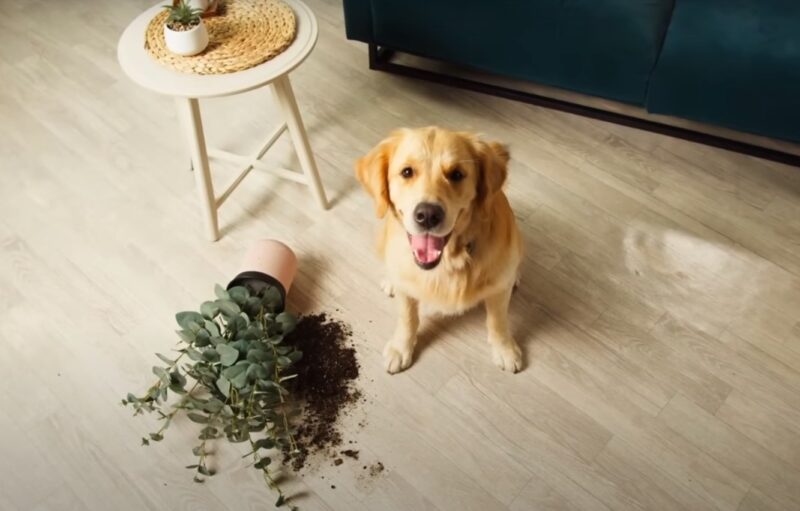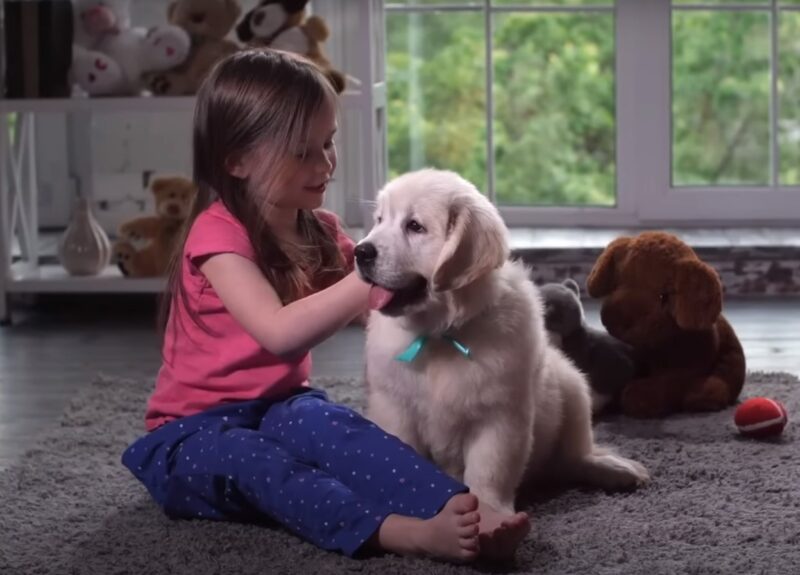Golden Retrievers, with their illustrious reputation for warmth and amiability, stand as beacons of the ideal family dog, renowned globally for their unmatchable temperament and intellectual prowess.
These dogs have seamlessly woven themselves into the fabric of countless households, not merely as pets but as integral members of the family, serving roles that span from cherished companions to indispensable assistance dogs.
Yet, within this seemingly perfect portrait, some owners are confronted with a perplexing shadow: instances of aggression in their Golden Retriever puppies. This stark contrast to their breed’s celebrated demeanor can leave many bewildered and concerned.
The root causes of aggression in these generally placid creatures, we can begin to navigate the path towards resolution and prevention. This exploration is not just about mitigating aggression but about preserving the harmony and safety of our homes, ensuring that the bond between these golden-hearted dogs and their human families remains unbroken and flourishes over time.
Common Causes of Aggression

Several factors can contribute to the development of aggressive behavior in Golden Retriever puppies. These include genetic predisposition, lack of socialization, fear, pain or illness, resource guarding, and dominance issues.
While genetics may play a role, environmental factors and experiences during the critical early stages of a puppy’s life are often more significant in shaping behavior.
| Cause of Aggression | Description |
|---|---|
| Genetic Predisposition | Inherited traits that may predispose a puppy to aggressive behavior. |
| Lack of Socialization | Insufficient exposure to various people, animals, and environments, leading to fearfulness or aggression towards unfamiliar situations. |
| Fear | Response to perceived threats or uncomfortable situations, resulting in defensive aggression. |
| Pain or Illness | Discomfort or pain from medical conditions can lead to irritability and aggression when touched or approached. |
| Resource Guarding | The act of protecting possessions such as food, toys, or space, which can manifest as aggressive behavior towards others. |
| Dominance Issues | Attempts to assert control over other dogs or people, influenced by the dog’s understanding of social hierarchy within the household. |
The Role of Socialization

Socialization is critical in the early stages of a puppy’s life. It involves exposing the puppy to a variety of people, animals, environments, and situations in a positive and controlled manner.
Lack of socialization can lead to fearfulness and aggression towards unfamiliar people, dogs, and situations. Golden Retriever puppies are especially receptive to socialization between the ages of three and sixteen weeks. Missed opportunities for socialization during this period can result in a dog that is fearful or aggressive in new situations or with unfamiliar people or animals.
Fear and Anxiety
Fear is a common cause of aggression in dogs. A Golden Retriever puppy may exhibit aggressive behavior when it feels threatened or scared. This can occur in situations where the puppy is exposed to loud noises, unfamiliar environments, or threatening gestures from people or other animals. In such cases, the aggression is a defensive mechanism, rooted in the instinct to protect oneself from harm.
Pain and Illness

Pain or illness can also trigger aggressive behavior in puppies. A dog that is experiencing discomfort may become irritable and less tolerant of interaction, which can lead to snapping or biting if it feels its personal space is being invaded.
Conditions like dental pain, ear infections, or joint issues are common culprits. Hence, it’s crucial to rule out medical issues when a sudden change in behavior is observed.
Resource Guarding
Resource guarding is another behavior that can manifest as aggression in Golden Retriever puppies. This occurs when a dog feels the need to protect its possessions, such as food, toys, or even a favorite resting spot, from others.
The puppy may growl, snap, or bite if it perceives that someone is attempting to take its valued resource away. This behavior stems from instinctual drives but can be exacerbated by the environment or experiences.
Dominance and Hierarchical Challenges

The concept of dominance and the establishment of a hierarchical order within the household can also influence a puppy’s behavior. While the dominance theory has been widely debated and nuanced in recent years, it’s acknowledged that dogs are sensitive to the structure and clarity of their social group. A Golden Retriever puppy may exhibit aggressive behaviors in an attempt to understand its place within the family unit or in response to inconsistent leadership and rules.
Strategies for Managing and Preventing Aggression

Addressing aggression in Golden Retriever puppies requires a multifaceted approach, focusing on understanding the underlying cause, consistent training, positive reinforcement, and sometimes professional help.
- Professional Evaluation: If a puppy shows signs of aggression, the first step is to consult a veterinarian to rule out any medical issues. Following that, a professional dog trainer or a veterinary behaviorist may provide insights and strategies tailored to the puppy’s specific situation.
- Consistent Training and Positive Reinforcement: Implementing consistent training routines and using positive reinforcement techniques are vital in shaping desired behaviors. Rewarding the puppy for calm and non-aggressive interactions reinforces positive behavior patterns and helps in establishing trust and a strong bond between the puppy and its owner.
- Socialization: Ensuring that the puppy has positive experiences with a variety of people, animals, and environments during its critical socialization period can prevent fear-based aggression. Continuing socialization beyond the initial period is also beneficial in maintaining well-adjusted behavior.
- Resource Management: Teaching a puppy to trust that its resources are safe and that relinquishing them will result in a positive outcome is crucial in preventing resource guarding. Training exercises that involve exchanging items for treats or other rewards can be effective in addressing this behavior.
- Establishing a Routine: Dogs thrive on routine and clear expectations. Establishing a consistent daily schedule for feeding, exercise, and training helps in providing a sense of security and structure, reducing anxiety and stress that can lead to aggression.
- Seeking Professional Help: In cases where aggression is severe or the owner is unable to manage the behavior, seeking the assistance of a professional dog trainer or behaviorist is crucial. They can offer personalized advice and training strategies, including behavior modification techniques that address the root cause of the aggression.
FAQs
Can a Golden Retriever puppy’s diet influence its aggressive behavior?
Yes, a puppy’s diet can have an impact on its behavior. Nutritional imbalances or food allergies may contribute to irritability or aggressive tendencies in some cases.
A diet lacking in essential nutrients or one that doesn’t suit the puppy’s specific health needs can lead to discomfort or pain, indirectly causing aggression. Consulting with a veterinarian to ensure your Golden Retriever puppy is on a well-balanced diet suited to its age, size, and health requirements is advisable.
Are there specific training methods that should be avoided to prevent aggression in Golden Retriever puppies?
Training methods based on punishment or negative reinforcement should be avoided as they can exacerbate aggressive behavior.
Techniques that involve physical corrections, shouting, or intimidation can lead to fear, distrust, and even more aggression. Instead, focus on positive reinforcement methods that reward desired behaviors with treats, praise, or play, which encourage cooperation and strengthen the bond between you and your puppy.
How early can aggressive behavior be identified in Golden Retriever puppies?
Signs of aggressive behavior can sometimes be observed as early as 6 to 8 weeks of age, particularly if the aggression is rooted in genetic predisposition or early experiences.
What might initially appear as aggression in very young puppies can also be normal puppy behavior, such as mouthing or rough play. It’s essential to monitor the behavior as the puppy grows and consult a professional if the aggression seems persistent or escalates.
Can neutering or spaying my Golden Retriever puppy help reduce aggression?
Neutering or spaying can help reduce certain forms of aggression, especially those linked to hormonal drives. For example, it may decrease territorial or dominance-related aggression and reduce the likelihood of aggressive behaviors stemming from mating instincts.
It’s not a guaranteed solution for all types of aggression and should be considered as part of a broader approach to behavior management.
Is there a difference in aggression between male and female Golden Retriever puppies?
Both male and female Golden Retrievers can exhibit aggressive behavior, but the reasons and expressions of aggression might vary. Males may display more territorial and dominance-related aggression, particularly if not neutered. Females might show aggression related to protective instincts, especially if they feel their puppies or territory are threatened.
Individual personality and environmental factors play significant roles in behavior, making it essential to consider each puppy as an individual.
How do I safely intervene if my Golden Retriever puppy is displaying aggressive behavior towards another dog or person?
If your Golden Retriever puppy is showing aggression towards another dog or person, it’s crucial to intervene calmly and safely. Avoid shouting or physically punishing the puppy, as this can escalate the aggression. Instead, calmly remove the puppy from the situation, using a leash if necessary.
After the situation has deescalated, assess what triggered the aggression to avoid similar situations in the future. If this behavior is a recurring issue, seek advice from a professional dog trainer or behaviorist to address the aggression effectively.
Final Words
Aggressive behavior in Golden Retriever puppies can be concerning, but it’s often a symptom of underlying issues such as fear, lack of socialization, or discomfort. These causes and implementing strategies focused on positive reinforcement, consistent training, and socialization can significantly mitigate and prevent aggression.
Building a strong foundation of trust and communication between the puppy and its family is essential in nurturing a well-behaved and happy dog. In challenging cases, professional guidance can provide the necessary support to ensure the wellbeing of both the puppy and its owners, fostering a harmonious relationship for years to come.
